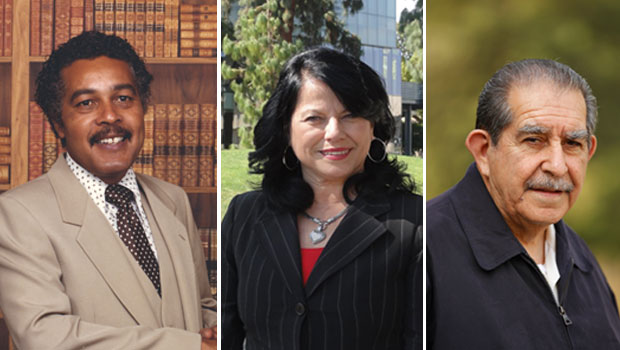Three pioneers of the Central Valley’s social work community will be honored at the second annual Social Work Legacy Dinner at 5:30 p.m. Friday, March 20 at TorNino’s Banquets (5080 N. Blackstone Ave.) in Fresno. The event commemorates National Social Work month.
Honored for their contributions to Fresno State and the region, former deans Dr. Benjamin Cuellar and the late Richard Ford will be recognized along with alumna Corinne Florez, coordinator of Fresno State’s Title IV-E Child Welfare Program.
Presented by the Department of Social Work Education at Fresno State and its alumni chapter, the event is the largest gathering of social workers in the Central Valley. The event brings together alumni, current and former faculty, friends and student ambassadors to celebrate the contributions the department and its graduates have made in the Central Valley for over 62 years.
“The majority of graduates from our program come from and reside in the Valley and make outstanding contributions to community through their work and civic participation,” said Dr. Virginia Rondero Hernandez, social work education chair.
Cuellar, dean emeritus of the College of Health and Human Services and professor emeritus of social work, first joined joined the Fresno State community in 1981 as a social work professor. From 1985 to 1994 he served as department chair, and in 1995 was appointed dean of the College of Health and Human Services. He was the first Chicano to serve as a dean in the history of Fresno State. His 15-year deanship ended when he entered the Faculty Early Retirement Program in 2009.
During his tenure, Cuellar is credited with helping establish the Title IV-E Child Welfare Program in the social work department, as well as the Central California Children’s Institute.
“His vision was to create educational opportunities for Central Valley families and children, especially those from diverse, disadvantaged and first-generation backgrounds,” Rondero Hernandez said.
Florez, who has served the Fresno State community for 23 years, built upon Cuellar’s work as the master of social work coordinator for the Title IV-E Child Welfare Program. After receiving her bachelor’s degree in child development in 1975 and a master’s in social work in 1978, both from Fresno State, Florez worked serving children and youth in the Valley.
In 1992, Florez began her career at Fresno State, serving multiple roles within the Title IV-E Program. Throughout her tenure with the program, Florez established four community partnerships that led to regional symposiums and practice advancement programs still used today, Rondero Hernandez said.
Ford joined Fresno State in 1972, taking on the leadership role as the dean of the then School of Health and Social Work. During his 22-year tenure, he provided leadership to the young social work program, which was the only one in the region between Los Angeles and San Francisco at the time to offer a bachelor of social work and a master of social work.
“He is credited with opening the doors to ethnic and disadvantaged students – and creating important university approach partnerships,” Rondero Hernandez said.
Ford, who was the first African-American dean at Fresno State, died in in 1997 at the age of 62. The Richard D. Ford Peace Plaza in Fresno State’s Peace Garden is dedicated in his honor.
“Having a degree in social work has its distinct advantages,” said Rondero Hernandez. “Social workers are in high demand in the fields of health care, mental health services, child welfare, senior services and veterans’ assistance, to name a few. There are increased employment opportunities working with individuals of all ages and backgrounds, as well as couples, families and communities. Currently, there are more than 650,000 professionally trained social workers in the United States and the U.S. Bureau of Labor Statistics predicts job growth to increase to 800,000 by the year 2020. The future is bright for those interested in becoming social workers.”
This year’s theme is “Social Work Paves the Way for Change” emphasizing how social workers have brought about major positive social changes and improved the lives of individuals and families.
For ticket information and reservations for the Legacy Dinner, contact the Department of Social Work Education at 559.278.3992.
Related Links:





